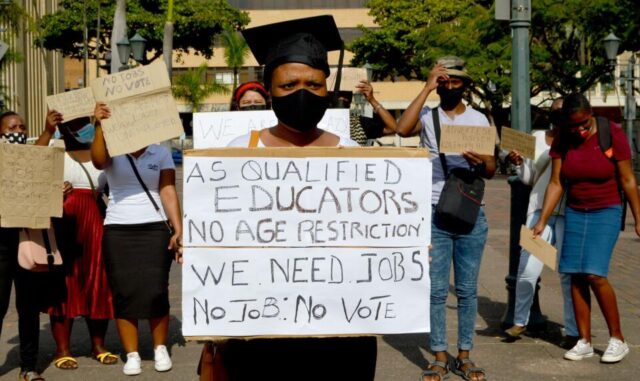Employment in the formal non-agricultural sectors of South Africa’s economy continued struggling to recover and could remain depressed as load shedding ramps up the costs of doing business.
EMPLOYMENT in the formal non-agricultural sectors of South Africa’s economy continued struggling to recover and could remain depressed as load shedding ramps up the costs of doing business.
Data from Statistics South Africa (StatsSA) on Tuesday showed that total employment in the formal non-agricultural sector went down by 21,000 in the first quarter of 2023, bringing total employment to 9.97 million.
The Quarterly Employment Survey showed that 5 out of 8 industries have not returned to pre-pandemic employment levels.
Full-time employment fell by 63,000 or 0.7 % quarter-on-quarter, from 8,881,000 in December 2022 to 8,818,000 in March 2023.
However, part-time employment increased by 42,000 or 3.8% over the same period, from 1,110,000 in December 2022 to 1,152,000 in March 2023.
On a yearly basis, full-time employment decreased by 24,000 or -0.3% between March 2022 and March 2023, while part-time employment fell by 73,000 or -6.0% over the same period.
According to StatsSA, many of the jobs shed were in the trade sector, in line with post-festive season lay-offs, followed by business services, transport and construction.
Job losses in construction have continued, but at a slower rate, although the sector has lost a net 2,000 jobs compared to the previous quarter.
However, the figure expands to more than 100,000 jobs lost since the start of 2019, highlighting a sector mired with demand and profitability issues.
Most of the jobs lost in business services and transport were full-time jobs, while trade shed mostly part-time jobs.
FNB senior economist Koketso Mano noted that relative to a year ago, employment had fallen by 97,000 jobs, or a 1.0%, decline, reflecting a weakening economy.
Mano said the recovery in employment remained incomplete, with employment still lower by 259,000 or 2.5% compared to the first quarter of 2019.
She said sticky inflation and tighter financial conditions should slow global activity this year, and this, along with local energy and logistical constraints, were likely to impede employment prospects.
“Furthermore, the lift in the local cost of doing business should weigh on profitability and wage bargaining. While the recovery in earnings has outpaced that in employment, these headwinds should constrain growth in both measures in the near-term,” Mano said.
“Over the longer-term, continued investment in alleviating productivity constraints should usher in more robust economic growth and support more broad-based and inclusive employment growth.”
Meanwhile, StatsSA said the total gross earnings paid to employees declined by R34.1 billion, or 4.0%, quarter-on-quarter, from R864.2 billion in December 2022 to R830.0 billion in March 2023.
However, these earnings were 5.5% higher than a year ago and have firmly surpassed 2019 first quarter levels by 18.6%.
Mano said many sectors had lower basic salary/wage payments compared to last quarter, signalling constrained profit margins as the cost of doing business has lifted amid a challenging economic climate.
“Only the construction sector recorded a contraction in basic salary payments compared to last year. Overall average monthly earnings (including overtime and bonuses) are down by 2.7% quarter-on-quarter, but up 6.8% year-on-year,” she said.
“Inflation-linked wage adjustments should support growth in nominal compensation, but real incomes in many industries are likely to remain under pressure.”
The Congress of SA Trade Unions (Cosatu) said the employment statistics were an alarming sign of stagnation of the economy, adding that the government and business needed to treat unemployment as the number one crisis as a nation.
“Continuing along the path of reckless austerity budget cuts to key public services in the state, allowing municipalities to continue to underspend their infrastructure roll and allowing billions to be lost in the fiscus to wasteful expenditure and corruption cannot be allowed to continue,” Cosatu said.
“The government needs to double its efforts to support Eskom’s energy action plan to end load shedding. We need a more coherent and active intervention plan by the state to secure and rebuild our freight and passenger railway network and modernise our ports.”
– BUSINESS REPORT








